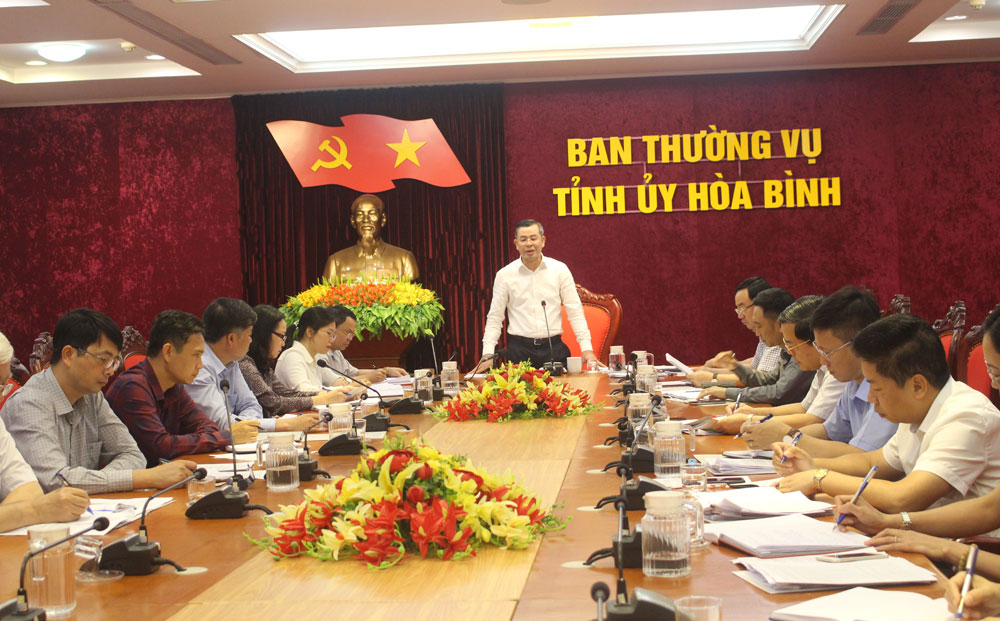
(HBO) – Member of the Party Central Committee and Secretary of the provincial Party Committee Ngo Van Tuan held a working session with the provincial financial sector on April 14 to review State budget performance and public investment disbursement in the first quarter as well as launch key tasks for the remaining months of this year. Attending the event were Vice Chairman of the provincial People’s Committee Quach Tat Liem and leaders of departments and agencies.
 Member of the Party Central
Committee and Secretary of the provincial Party Committee Ngo Van Tuan speaks at
the working session.
Member of the Party Central
Committee and Secretary of the provincial Party Committee Ngo Van Tuan speaks at
the working session.
The provincial Finance Department reported
that State budget collection reached over 1 trillion VND in the first quarter,
or 23 percent of the estimate set by the Government. Of which, 897.4 billion
VND was domestic collection, equivalent to 19 percent of the target set in the
Resolution of the provincial People’s Council, up 26 percent year-on-year. Collection
from exports hit 103.4 billion VND, or 171 percent of the figure in the same
period last year.
The province disbursed 55.9 billion VND, or
14 percent of the plan by the provincial People’s Committee.
At the working session, delegates shared
the view that State budget collection showed progress year-on-year. They
pointed out difficulties and challenges as well as offered suggestions to
improve the efficiency of the effort, accelerate disbursement progress and tax
debt collection.
Concluding the event, Tuan hailed the
sector for effectively managing and using resources for socio-economic
development.
Basically agreeing with the sector’s
measures, Tuan asked the sector to materialise the Resolution of the 17thprovincial Party Congress via action plans and programmes, improve the
efficiency of giving advice to the province to perform State budget task, with
special attention given to building a contingent of responsible and capable finance
officers to fulfill assigned missions. He asked the sector to partner with
relevant units to accomplish the budget collection task, remove difficulties in
production and business, and improve the investment environment, thus creating
a sustainable source of income for the State budget./.
Hoa Binh province is undergoing a dynamic transformation amid Vietnam’s national digital transition. Building on Poliburo’s Resolution No. 57-NQ/TW on breakthroughs in science, technology, innovation, and national digital transformation, the province has rolled out a wide range of practical action plans. A standout initiative is the "Digital Literacy for All” movement, an effort to ensure that no one is left behind in the digital era.
Hoa Binh province is undergoing a dynamic transformation in the wake of the national digital transformation movement. Building on Resolution No. 57-NQ/TW of the Politburo on breakthroughs in science, technology, innovation, and national digital transformation, the province has implemented a wide range of practical action plans. A standout initiative is the "Digital Literacy for All” movement ambitious effort to ensure that no one is left behind in the digital age.
With a spirit of unity and proactive problem-solving, the Party Committee, the government and the people of Dong Lai Commune (Tan Lac District) have made great strides in implementing the resolutions of the 24th Party Congress of the commune for the 2020 - 2025 term. Focusing on leadership and practical actions, the commune has brought the Party’s resolutions into daily life, creating strong impacts and pushing the local development forward.
Amid the nationwide push for digital transformation, young people in Hoa Binh Province are stepping up as dynamic pioneers, applying technology to enhance Youth Union operations and expand the reach of youth-led initiatives. Through creativity and adaptability, Youth Union organizations at all levels have introduced a series of practical solutions, contributing to modern governance and community development.
In recent years, An Nghia commune, located in Lac Son district, has stepped up administrative reform, focusing on improving the quality and efficiency of its single-window service unit for receiving and processing administrative procedures. These improvements have helped create favourable conditions for local residents and organisations to handle administrative procedures, contributing to the commune’s broader socio-economic development.
The Prime Minister-approved master plan to develop the multi-use value of forests ecosystems through 2030, with a vision to 2050, aims to improve the management and sustainable use of forest resources, create jobs, increase incomes, and improve the living standards of ethnic minorities, people in mountainous and remote areas, forest workers and those living near forests.



 Member of the Party Central
Committee and Secretary of the provincial Party Committee Ngo Van Tuan speaks at
the working session.
Member of the Party Central
Committee and Secretary of the provincial Party Committee Ngo Van Tuan speaks at
the working session.